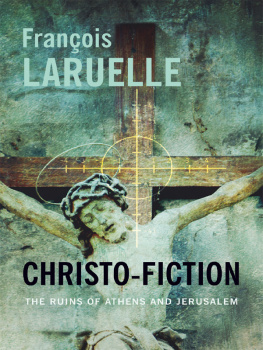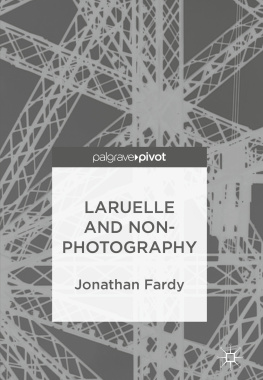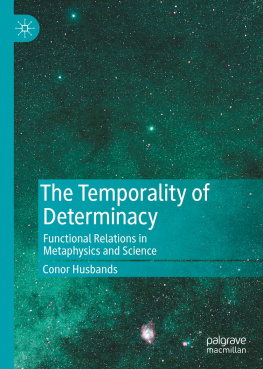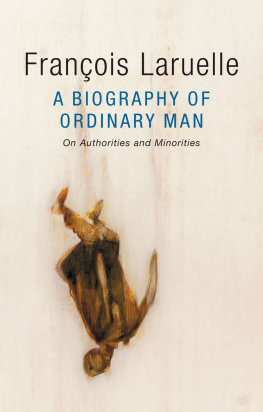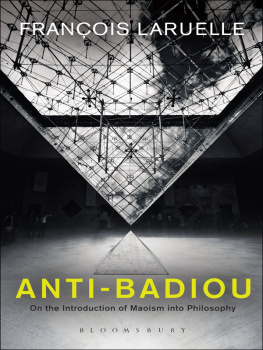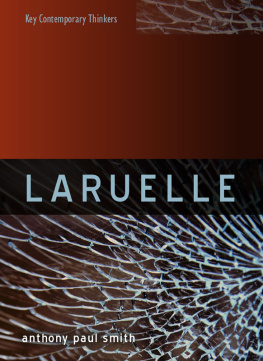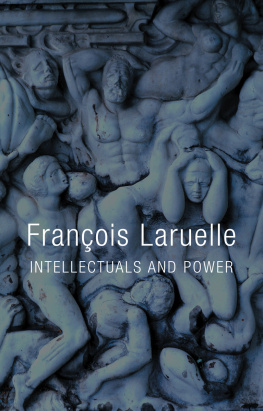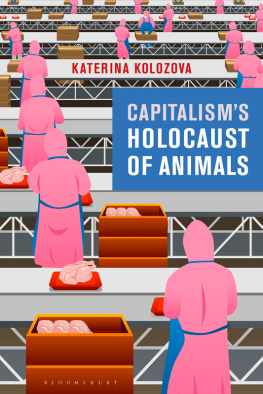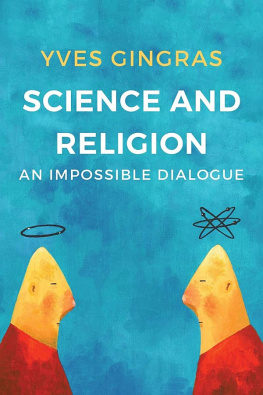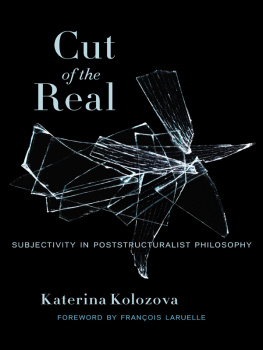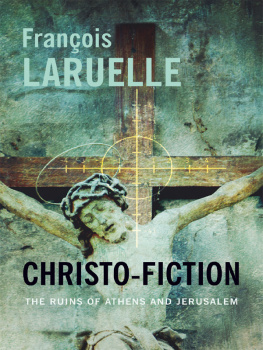CHRISTO-FICTION
INSURRECTIONS: CRITICAL STUDIES IN RELIGION, POLITICS, AND CULTURE
INSURRECTIONS
CRITICAL STUDIES IN RELIGION, POLITICS, AND CULTURE
Slavoj iek, Clayton Crockett, Creston Davis, Jeffrey W. Robbins, Editors
The intersection of religion, politics, and culture is one of the most discussed areas in theory today. It also has the deepest and most wide-ranging impact on the world. Insurrections: Critical Studies in Religion, Politics, and Culture will bring the tools of philosophy and critical theory to the political implications of the religious turn. The series will address a range of religious traditions and political viewpoints in the United States, Europe, and other parts of the world. Without advocating any specific religious or theological stance, the series aims nonetheless to be faithful to the radical emancipatory potential of religion.
For a list of titles in the series see .
Franois
LARUELLE
CHRISTO-FICTION
THE RUINS OF ATHENS AND JERUSALEM
TRANSLATED BY ROBIN MACKAY
COLUMBIA UNIVERSITY PRESS | NEW YORK
Columbia University Press
Publishers Since 1893
New York Chichester, West Sussex
cup.columbia.edu
Copyright 2015 Columbia University Press
All rights reserved
E-ISBN 978-0-231-53896-1
Library of Congress Cataloging-in-Publication Data
Laruelle, Franois.
[Christo-fiction, les ruines dAthnes et de Jrusalem. English]
Christo-fiction, the ruins of Athens and Jerusalem / Franois Laruelle; translated by Robin Mackay.
pages cm. (Insurrections: critical studies in religion, politics, and culture)
Includes bibliographical references and index.
ISBN 978-0-231-16724-6 (cloth : alk. paper) ISBN 978-0-231-53896-1 (e-book)
1. Jesus ChristPerson and offices. 2. Jesus ChristGnostic interpretations. 3. ChristianityPhilosophy. I. Title.
BT203.L3513 2015
230dc23
2014031086
A Columbia University Press E-book.
CUP would be pleased to hear about your reading experience with this e-book at .
Cover image: Mark Owen / Trevillion Images
Cover and book design: Lisa Hamm
References to websites (URLs) were accurate at the time of writing. Neither the author nor Columbia University Press is responsible for URLs that may have expired or changed since the manuscript was prepared.
To Robin Mackay and my other British and American translators
CONTENTS
O ur situation may be defined as follows: the war of religions continues, and there will be no Christian return of Christ. If Christianity is the religion of the exit from religions, Christ is the exit from Christianity itself. Let us take a step further, fulfilling this insurrection. It is up to us to invent his impossible coming.
So many christs have been imagined, so many gospels written, plagiarized, copied, canonized or kept secret, unfolded in the light of exegesis or buried in the desert; so many christologies and hermeneutics, so much literature elevated to the dignity of theological and sometimes canonical texts, that there is nothing excessive in inventing anew his advent, by proposing a christo-fiction that openly declares and advocates itself as such and that consists in a controlled conjugation of renewed scientific-type procedures and old philosophical-type theological models. Why should painters be allowed this right of invention, above and beyond that of mere cataloguingthe right to mix their colors with the flesh and blood of Christ? Why should evangelists, historians, theologians, confessions, churches, and believers have the right to freely fabricate images and stories when there may be a discipline of Christ that, while still fictional, is this time rigorousa discipline of the faithful grasping themselves as quasi-physicists of the body of Christ, striving to speak his substance and his effects? If Christ cannot be identified with the set of legends that is Christianity, if he is barely recognizable in his Jewish milieu through his Greek wordsa folly for philosophy and a paradox for the Jewsthen it is urgent that we revise our categories, which are still those of our beliefs; that we take the leap of thought that is called fidelity, and forge a fiction capable of upholding this fidelity. Above all, not rationalist or materialist disillusionmentthat reason is not ours, that materialism is not the materiality of the blood and flesh of Christ. This book, therefore, is not written so as to enrich the treasury of theological knowledge, to verify once more its standards of acceptability, still less those of academic admissibility. Under the punctilious gaze of those standards, its author can only confess shame and confusion.
What is a rigorous fiction, and is it worth pursuing if it does not essentially reproduce an already recognized truth? Our problem is not that of traditional theology and christology, which, in a sense, we do not seek to challenge; they are first-degree disciplines or symptomal material, like the philosophy with which they are impregnated. Our problem is the Principle of Sufficient Theology (PST) that has taken hold of them. Believing themselves sufficient to think Christ-in-person (the Christ of the faithful rather than that of believers), they lack a second dimensionlet us say a theologically and christologically nonstandard dimension. It is a question of drawing them out from their lived (vcu) of belief and their legendary historical tale, of positing the conditions of their use as means directed toward the raising of a Christ more authentic than the legendary Christ because his excess and his effect will be commensurate with ordinary or generic manas if the intention were to establish what certain physicists call the anthropic principle within the human sphere. A fictional or fictioning fidelity is certainly not a fiction of fidelity. With new means, of nontheological provenance and of what we shall call a quantum-oriented order, we have won the right to be atheist religious leadersthat is to say, atheists capable of taking religions from the side where they are usable, and of relating them to that special subject called last instance that is generic man.
that is nonpositive (in which case fiction is a higher-degree formalization, since it is subtended by scientific knowledges). Neither ancient nor modern, the contemporary of Christ that we seek to be is contemporary either through unfounded, apparent, and hence all the more sufficient belief, or through generic and modelized faith. Two types of truth, two types of subject. Belief is a supposed truth that can be recognized subsequently as being only a fiction. Faith is a truth established a priori under the rigorous conditions of a well-founded fictionthat is to say, a fiction founded on the conjugation of a positive knowledge and a theological symptomatology. Perhaps a new kerygma is announced here: belief is the sufficiency of God, but faith is the nonsufficiency of Christ and thus of humans who abase or bring down the sufficiency of God. To sum up all of this, the target and the arrow, we have on one side a Principle of Sufficient Theology, and on the other side (the side from which our struggle is prosecuted) a necessary but nonsufficient faith.
W hat are we to do with the twofold tradition, that of christologies and philosophies, that of the Christian literature of the Gospels and of the lives of Jesus? If a dialectical reconciliation (Hegel) or a thinking conciliation (Heidegger) have already been tried under the theological authority of philosophy, if exegesis and history have only succeeded in interring and dispersing the message in the inert sands of positivity, what has not yet been done is to conjugate science and theology in a completely new wayin a gnostic spirit that, this time, will make use of quantum theory. How can these two be crossed, as variables equally necessary to thought, stripped of their sufficiency, neither of them any longer claiming to make sense of the other and to dominate it? They are not mere materials, and only abandon their claims within a special matrix for which quantum theory and theology serve only to modelize the whole of the christic messagenot to constitute it (it already exists) nor to decide upon its interpretations (there are already too many) but to reorient its use in terms of the humans to whom it is addressed. Thus nothing is lost of the rational rigor necessary for a thought that must refuse all belief, nor of the essence of the kerygma (that is to say, of the faith that defines the faithful). This essay is not a methodological one, a Critique of Pure Theological Reason, nor an exercise in supposedly infallible dogma or discipline, nor indeed one dealing with separate theologemes. It is an essay in the vision-of-Christ-in-Christ and not in the vision-of-the-world-in-the-world. The method, more than ever entangled with its object, treats every separated hermeneutic, axiomatic, and dogmatic as properties of the same object become complex through the integration of its dimensions. However it is certainly not a return to our old enemy, the dialectic, arisen from the empty tomb of philosophy. If you must have a governing thesis or a principle then here it is, in all its brutality:

